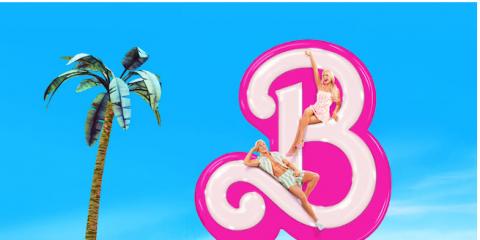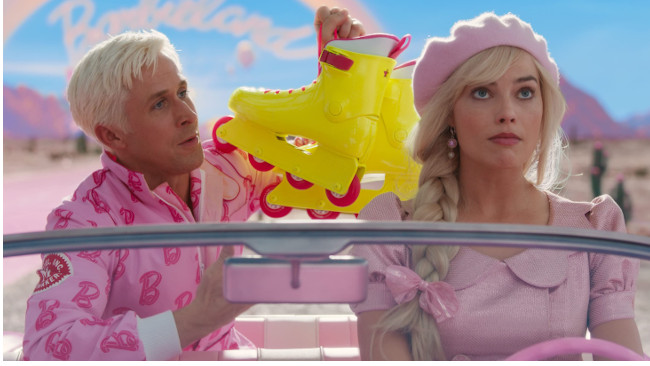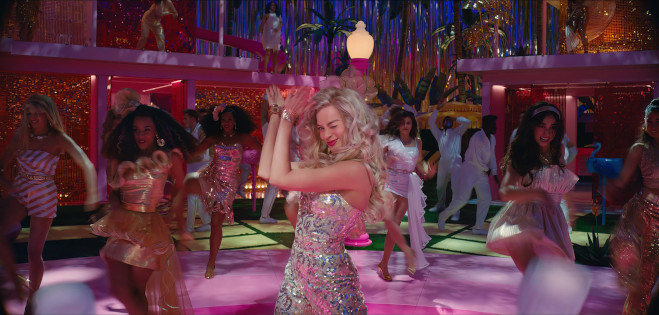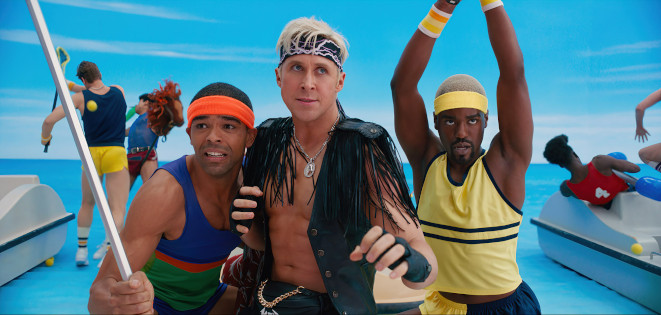It’s a ‘Barbie’ World and We’re Just Living in It

AT A GLANCE
“Barbie”
Directed by: Greta Gerwig
Starring: Margot Robbie, Ryan Gosling, America Ferrera, and Will Ferrell
Rated: PG-13 for suggestive references
The main trailer for writer-director Greta Gerwig’s “Barbie” proclaims that the movie is for both those who love and hate Mattel’s iconic doll franchise, and it is a rare case of truth in movie advertising. Gerwig’s film is bold, flashy, clever, melodramatic and thoughtful … and it, indeed, should play to everyone.
I will hazard a guess that most in my demographic (55-year-old male) haven’t owned a Barbie and haven’t spent considerable time weighing the merits of characters like Midge and Skipper, but Gerwig’s film is so delightfully fleshed out that it seems made for us.

Does that mean it bails on the core demographic (women and girls who have doted on the dolls for years or even decades)? Absolutely not. This is a film that embraces Barbie’s iconic status while gleefully poking fun at the franchise’s missteps, and – as Gerwig points out on screen – there have been many of the latter. This is a tough line to walk, and viewers should give Mattel credit for signing on. When folks in the executive branch decided not only to allow the film to comment on some of the troubling representational messages Barbie has sent over the years … but to open commentary on them, it was brilliant. In a world where, too often, cultural critique is taken out of context and the players involved act dumb, “Barbie” is a breath of fresh air.
More than anything, the film is about female empowerment, an agenda that commentator Ben Shapiro has apparently been ruffled by. The controversy is bizarre since the movie simply dares to point out what anyone paying attention already knows. The rules for men and women are different and – historically – men have had it easier -- at least when it comes to career advancement, wages, and attaining political power. How someone like Shapiro could be so troubled by the mention of such well-established facts is strange, but one doesn’t burn Barbies unless their world has been rocked.
Interestingly, “Barbie” pushes its equality agenda by demonstrating that the namesake doll franchise is one of the rare places where men (or at least plasticky, genital-free representations of them) have no power. In Gerwig’s “Barbie,” the Kens exist only as accessories. They are trophy boyfriends designed to please the female gaze and reflect the splendor of their companions. Sound familiar, ladies?

When Stereotypical Barbie (Margot Robbie) has an existential crisis due to unrelenting thoughts of death, the appearance of cellulite, and a sudden flattening of her feet, she is forced to transition from her world into our own. We learn this when the heroin visits Weird Barbie (Kate McKinnon), who isn’t what she used to be because her owner played with her too hard. The brutal play regimen resulted in chopped hair, a marker-tatted face, and legs bent into eternal splits, but Weird Barbie is as wise as beat up. She knows that Stereotypical Barbie must face her crisis head on by finding out who’s playing with her. Because he is happy only when next to Barbie, Beach Ken (Ryan Gosling) tags along.
What the two dolls find in the real world is shocking … to them. In an astonishing reversal, people actually pay attention to Ken (he is in heaven when somebody asks him the time), and many of the men treat Barbie as a sex object. After the two are arrested (a second time) for minor infractions related to cultural misunderstanding, the male police officers note that Barbie looks even better with more clothes on because it leaves something to the imagination. Scenes like this are funny while making important points. The real world also makes an impression on Beach Ken who – after so many years as an afterthought – is thrilled that he actually matters. Without giving away too much, I can say that Beach Ken’s character arc is every bit as powerful as Barbie’s -- perhaps even more.
As the movie progresses, Barbie meets her owners – a young girl named Sasha (Ariana Greenblatt) and her mother, Gloria (America Ferrera). Because the film is a broad comedy, it takes no time for these real-world counterparts to accept the fact that Stereotypical Barbie is a doll come to life and not a doll-convention cosplayer having a psychotic break.
Also, Mattel execs, the CEO played marvelously by Will Ferrell, learn that Barbie has entered the real world, launching a nifty subplot that makes Mattel look both thoughtful and sinister. Again, kudos to the company for realizing that audiences (most at least) aren’t made up of dolts. The company’s willingness to become the butt of a few jokes goes a long way, especially when (let’s face it) the entire picture is a massive product-placement ad.

The biggest knock on the film is that it’s talky. It is funny to hear dolls wittily discussing the importance of representation and the follies of womanhood, but there are numerous scenes where the philosophical banter outlasts the depth of the material. One needn’t give 15 examples of the ways women have it rough, when the point was well established at five. This, however, is a relatively minor complaint. These moments do bog the film down and create a lurching rhythm, but they are infrequent and more than offset by the excellence of the overall picture.
The art direction and sets in Barbie are breathtaking. When Robbie, Gosling, and other members of the Barbie family are in their world, it looks like a toy wonderland. The Dreamhouses are massive recreations of the real thing. The beaches don’t have water, the food is plastic. It’s glorious.
The color palette is beautiful throughout, and the performances are what you expect from such a talented cast. Robbie and Gosling steer the ship and each is wonderful, but they never upstage their costars.
There is a strange subplot involving Allan (a doll marketed as Ken’s buddy). The doll, as portrayed by Michael Cera, is funny, but also seems queer coded. While that isn’t automatically problematic, it’s not entirely clear what Gerwig hopes this representation will say. It could be a subtle attempt at inclusiveness, but Allan is an odd duck, embraced by neither the Barbies nor the Kens, and that leaves a lot of possible interpretations. This is especially true since the movie seems to indicate that, while the dolls take gender roles, they do not engage in sexual relationships.
Foibles and all, “Barbie” is a success. In a world where mass-market blockbusters are often little more than thoughtless cash grabs, Gerwig and co-writer Noah Baumbach have turned the story of a children’s toy into a meaningful romp that is as thought-provoking as it is fun.
Author Bio:
Forrest Hartman is Highbrow Magazine’s chief film critic.
For Highbrow Magazine































































































































































































































































































































